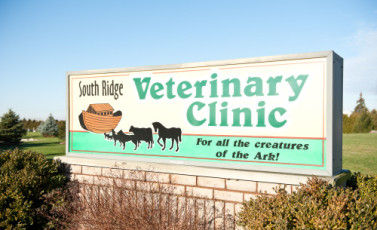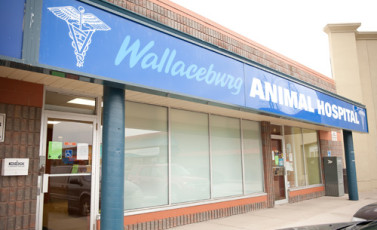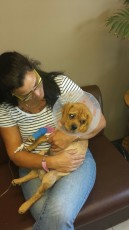Canine Parvovirus, what you need to know

Earlier this year Thetis a pug mix puppy contracted parvovirus. Luckily Thetis’ story is a happy one. He had received his first two boosters (and wasn’t quite old enough for his third), these boosters coupled with the fact that is owner recognized his symptoms and brought him to the hospital for treatment almost immediately likely saved his life.
Here’s what you need to know about parvovirus, so you too can recognize the signs and help protect your furry family member from danger.
Canine Parvovirus is a potentially deadly infectious agent that typically infects puppies but un-
vaccinated adults are also susceptible. Very rarely a vaccinated adult dog can become ill but this is often due to a poorly functioning immune system and is unlikely to occur in a healthy dog. It is important to remember that this virus has been around since the 1970’s, is hard to disinfect, and is shed in extremely large numbers by infected dogs. This means that there is virus everywhere: on every carpet, on every floor, in every yard and park.
Parvovirus enters the body through the mouth when the dog is exposed to infected fecal material. There is an incubation period of 3-7 days during which the virus is replicating within the body but the dog shows no symptoms. The virus targets and destroys important cells within the bone marrow that would help fight off the infection and then delicate intestinal cells. Without functional intestinal cells the body does not absorb nutrients and intestinal bacteria can enter the bloodstream causing sepsis (widespread infection)
Common symptoms are: vomiting, diarrhea (often bloody) lethargy and poor appetite.
The virus kills in two ways:
- Diarrhea and vomiting results in severe dehydration, shock and subsequently death
- The pet becomes septic (bacterial infection in the blood stream)
There is no specific mediation to combat this virus and treatment is directed at supportive care. Survival rates vary between 50-80% with aggressive medical therapy including including hospitalization, intravenous fluids, antibiotics to prevent or treat sepsis, pain control and medication to help with vomiting and nausea.
Luckily for us modern vaccines for parvovirus are very effective and adverse vaccine reactions are not common. It is ideal that a puppy receive a series of vaccinations given at 8, 12, and 16 weeks of age to ensure optimal protection. If your dog’s vaccine schedule does not match this timeline do not panic! Your veterinarian will know how to set you up with a vaccine booster program that will offer your furry friend the protection that he/she needs.
Call us today to inquire about your dog’s vaccine status and if overdue we can schedule a vaccine appointment ASAP.
Written by Dr. Amanda Estabrooks D.V.M






